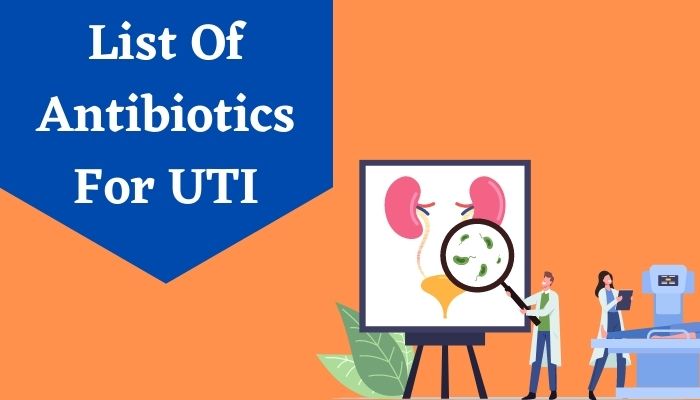Shima, a 40-year-old woman, was surprised to feel a burning sensation while urinating. It later turned to recurring pain and urgency in peeing now and then. When this persisted, she called on her doctor who confirmed that it was nothing but a UTI (urinary tract infection). She also prescribed UTI treatment antibiotics for combating the problem.
If you are also seeking an antibiotic for UTI, remember that you should only consume UTI medicines on your doctor’s advice above everything else. There is nothing like the best antibiotic for UTI since there are multiple options available. UTI infections result from bacteria invading the kidneys, bladder, and other areas in the urinary tract. Antibiotics help in eliminating such bacteria which cause irritable infections.
Best Antibiotic for UTI Infections
Doctors will collect samples of urine to confirm whether someone is plagued by a UTI (urinary tract infection). The laboratory will also be growing germs for some time to discover the bacterial type, which is known as culture. It will help your doctor understand the germ type which led to the infection. The following UTI treatment antibiotics may be recommended as a result:1. Ceftriaxone (Rocephin)
2. Nitrofurantoin (Macrodantin, Macrobid)
4. Fosfomycin (Monurol)
5. Ciprofloxacin (Cipro)
6. Levofloxacin (Levaquin)
7. Trimethoprim/sulfamethoxazole (Bactrim, Septra
8. Cephalexin (Keflex)
The dosage and medicine will largely depend on the type of infection, i.e., the complications involved. Uncomplicated infections are common while complicated infections indicate issues with the urinary tract. There could be a narrowing symptom of the ureters, the tubes carrying urine to the bladder from the kidneys, and a narrowing of the urethra, transporting urine out of the body. It could also be a blockage from the enlargement of the prostate or a kidney stone. It may also be something like a urinary fistula or a bladder diverticulum.
A higher dosage of antibiotics may be recommended for the treatment of infections of a complicated nature. If the UTI stays severe or there is an infection plaguing the kidneys, then you may have to get treatment at the doctor’s clinic or hospital. Doctors will also weigh aspects like pregnancy, age, allergies, and side effects while prescribing antibiotics and similar medication.
Duration of Taking Antibiotics
This information will be communicated by the doctor after you get the prescription. For infections without complications, you may take them for about 2-3 days while some people will have to take them for roughly 7-10 days at times. For complicated infections, you may need to take antibiotics for a cycle of 14 days or even higher.If you still witness any symptoms after completing your course, then the doctor may recommend a follow-up urine test as well. If the infection persists, then antibiotics will go on for a longer duration than usual. Those suffering from frequent UTIs will have to keep taking antibiotics regularly. If sexual activity is a cause behind UTIs, then the medicines may have to be consumed before engaging in the same. You may also take antibiotics on your doctor’s advice if you find yourself suffering from any new type of UTI.
Side Effects Worth Noting
Some antibiotics may be accompanied by side effects such as- Diarrhea
- Rashes
- Nerve or tendon damages
- Vomiting
- Nausea
- Headaches.
When is Full Dosage Recommended?
Antibiotics usually function well with regard to combating UTIs. You may start feeling better automatically after taking them over a certain period. However, you should follow the entire treatment course as recommended by your doctor. Stopping antibiotics suddenly may lead to erratic removal of bacteria in the urinary tract. These germs may sometimes develop resistance towards several antibiotics and the medication will henceforth be unable to eliminate them as well.Hence, if there is a new UTI, then the existing medication may not work properly. Hence, you should always consume the full course of antibiotics as recommended by the doctor, ensuring that the bacteria have all been eliminated.
The Bottom Line
UTIs should be tackled immediately without delays. You should instantly call your doctor if you notice persistent symptoms that refuse to disappear and even if they start worsening. If you see the symptoms recurring after treatment or you have some side effects from the antibiotics, you should immediately reach out to your doctor.This will help you get the best guidance on how to handle the situation. UTIs are common issues for most people and can be treated effectively with antibiotics in most cases. However, you should make sure that you follow good vaginal and urinary health practices for combating future possibilities of them happening. At the same time, only take an antibiotic if it is prescribed to you by your doctor. Self-medication or treatment is not the right way forward in such cases. Do not neglect UTIs since they may snowball into major issues in the future.

